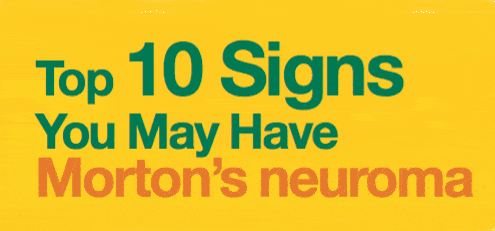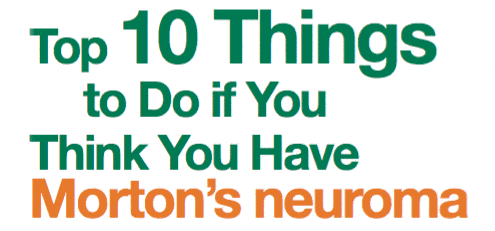Morton’s neuroma develops when a nerve in the foot swells because of irritation or compression. It commonly affects the area between the third and fourth toes. While benign, it can be very painful. When you have Morton’s neuroma symptoms, a simple task such as walking can become unbearable.
Typically, this condition has no external signs. Your foot would appear fine even if you’re experiencing Morton’s neuroma symptoms. To find out if you have this condition, check if you have these Morton’s neuroma symptoms:
Intense soreness in the ball of the foot or metatarsalgia is one of the most common Morton’s neuroma symptoms. It may feel like burning pain that could cause difficulty in walking and running.
Another example of common Morton’s neuroma symptoms is feeling like you’re standing on a hard lump, like a marble or pebble. People who have Morton’s neuroma symptoms could also feel like they’re standing on a wadded-up sock.
If your toes feel numb or tingly with pain that radiates from the affected area, you may have Morton’s neuroma. Another indicator that you might have Morton’s neuroma symptoms is feeling the need to constantly stop while walking.
Most people that are affected by Morton’s neuroma symptoms have the option of nonsurgical treatments, (like the one we offer). Morton’s neuroma symptoms can be treated with the use of ultrasound-guided radio frequency ablation.
Another alternative for treating Morton’s neuroma symptoms is performing ultrasound-guided cryoablation. Ultrasound-guided neurolytic ablation is another way of dealing with Morton’s neuroma symptoms.
We specialize in the treatment of Morton’s neuroma. Our team is committed to listening to our patients and evaluating Morton’s neuroma symptoms in order to move forward with treatment. We offer a number of noninvasive procedures to treat Morton’s neuroma symptoms.
At The Center For Morton’s Neuroma, we will work with you to develop a treatment plan that takes into account your unique medical history. In addition, our team can utilize a combination of non surgical procedures and advanced techniques.
If left untreated, Morton’s neuroma can limit your mobility and prevent you from doing the things you enjoy. You can rely on us to be your partner in helping restore your quality of life as much as possible. Get in touch with us today if you or a loved one is experiencing Morton’s neuroma symptoms.
Morton’s Neuroma is an increasingly painful condition. It occurs when the tissue around one of the nerves leading to the toes thickens, causing a burning sensation in the ball of the foot. It has been associated with the feeling of walking around in your shoes with a small rock constantly poking the ball of your foot.
Don’t let Morton’s Neuroma interfere with your daily routine. At The Center For Morton’s Neuroma, we’ll help you find the right treatment. We specialize in non-surgical interventions for our patients.
There are a wide range of treatments and procedures which can be used to treat Morton’s Neuroma. However, each individual responds differently to certain kinds of treatment. That is why at The Center For Morton’s Neuroma, we carefully make our diagnosis before deciding on the best approach to treat your Morton’s Neuroma. Here are some of them:
Unlike Radio Frequency Ablation which uses heat, Cryotherapy Ablation makes use of extremely cold temperatures. This procedure is done by using liquid nitrogen or argon gas in order to freeze and destroy tissues affected by Morton’s Neuroma.
This treatment involves injecting a sclerosing agents like concentrated alcohol into the affected tissue. This eliminates or at least significantly decreases the ability of the nerves to transmit pain signals, thereby causing pain relief.
Our custom-designed orthotics will help you with your biomechanical foot issues such as problems with walking and running. We offer two types of designs that ensure maximum comfort and rigidness for your feet. You can choose from:
Comfort Orthotic
This is designed to offer maximum support and shock absorption.
It also fits perfectly into any type of sneaker design.
Support Orthotic
Its 16-18mm heel cup depth is designed to provide fuller heel support. It is also made of thicker plastic which makes for better rearfoot control.
This minimally invasive treatment makes use of high-frequency radio waves which target nerves affected by Morton’s Neuroma. The heat emitted by these radio waves breaks down proteins which prevents nerve fibers from transmitting pain. In addition, this procedure stimulates the creation of new blood vessels which promotes healing.
This method involves harnessing your body’s natural ability to regenerate itself in order to promote the healing of injured tendons, ligaments, muscles and joints. Platelet Rich Plasma Injections are done by running your own blood into a centrifuge to concentrate the platelets. After this, the activated platelets are then administered into the damaged tissues.
For temporary pain relief, Corticosteroid Injections can be used on the affected area. This medication, however, should not be used as an initial treatment due to its adverse effects. Some of these include weakening of the muscles and ligaments which could lead to pain and instability.
This treatment transmits pressure waves onto the affected area through the use of Extracorporeal Pulse Activation Technology. These waves help stimulate metabolism, enhance blood circulation, and accelerate the healing process.
Don’t wait for your condition to get worse, contact The Center For Morton’s Neuroma today. We are committed to providing our patients with non-surgical treatments for their Morton’s Neuroma. Our philosophy is to only recommend surgical interventions as a very very last resort.
To know more about our products and services you can call us at (774) 421-9144 or email us at office@mortonsneuroma.com. You can also visit our clinic at 600 Worcester Rd, Suite 301, Framingham, MA 01702.


By providing us with your information you are consenting to the collection and use of your information in accordance with our Terms of Service and Privacy Policy.